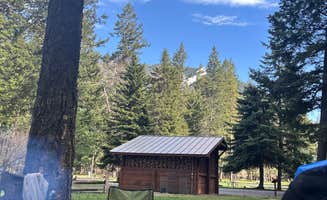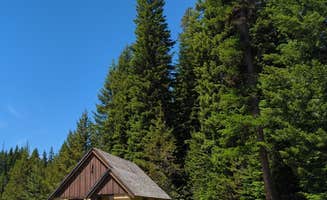Cabin accommodations near Enterprise offer rustic lodging options within Oregon's Wallowa Mountains. Situated at elevations between 3,600 and 7,000 feet, the area gets heavy snow in winter and warm, dry conditions in summer. Most cabins are found within established campgrounds and recreation areas, while a few historic guard stations provide more remote options.
What to do
Alpine tram rides: From Wallowa Lake, visitors can take the gondola to Mount Howard summit, 3,700 feet above the campground. "We took the tram up and visited a mountain summit 3700 feet above our location at the campground. There were numerous hiking trails, and fishing was a popular pastime for many campers," notes a visitor at Wallowa Lake State Park Campground.
Fishing the lakes and rivers: Fish Lake Campground provides access to mountain lake fishing at 6,990 feet elevation. "Outstanding action packed trout fishing. Far away from anything. Nice restrooms and natural spring is plumbed in to the campground. Best water I have ever tasted," reports a visitor to Fish Lake Campground.
Stargazing and wildflower viewing: The remote location of many cabins means minimal light pollution and abundant wildflowers. At Fry Meadows Guard Station, a camper noted, "This place is out in the wilderness and there is no light pollution. Watching the stars is awesome here. There are also a lot of wildflowers everywhere. I saw a ton of coralroot orchids and mountain lady slippers in mid June."
Wildlife watching: The area supports diverse wildlife populations. "This is bear country so if that's not your thing, I wouldn't camp there. Lots of things to do close by both inexpensive and more expensive," advises a camper about Wallowa Lake.
What campers like
River access: Many cabin locations feature direct river or creek access. "Beautiful sites most with river access. Some are kinda close together but we went on a Sunday and there was only one camper there so finding a site away from them was easy. River sound drowns out noises from the road or other campers," reports a visitor to Blackhorse Campground.
Hot springs: Some cabin accommodations include access to natural hot springs. "The hot tubs are small, but it really doesn't matter if no one is there. They are pool noodle friendly when it's not high occupancy. The Verizon signal is strong," notes a day visitor to Grande Hot Springs RV Resort.
Off-season tranquility: Many cabins remain open year-round with fewer visitors during winter months. Fields Spring State Park Campground receives high marks for its quiet atmosphere: "Small, quiet state park. We dreaded dealing with crowds over the 4th of July weekend and back in March, this was one of the few state parks where I could get reservations in this area."
Clean facilities: Visitors frequently comment on well-maintained facilities. "Sites are spacious and toilets were pristine," notes one Blackhorse visitor, while another at Fields Spring adds, "One restroom that was very clean with my three necessities: soap, hand dryers, and garbage."
What you should know
Reservation requirements: Most cabins require advance reservations, with peak season (June-September) filling months ahead. Some historic guard stations book up to 6 months in advance through recreation.gov.
Variable amenities: Cabin facilities range from very basic to fully equipped. At Two Color Guard Station, "The bunkhouse is beginning to show its age but it accommodates a large group and the enclosed porch on the back of the building is a treat. The grounds are enormous and close to Eagle Creek. Plenty of room and flat ground for several tent. Vault toilet only, but it's clean. Bring your own water."
Road conditions: Access to remote cabins often requires travel on unpaved roads. Two Color Guard Station is "near the end of 18 miles of unpaved mountain road and some of the most spectacular mountain scenery along the way."
Weather variations: Mountain weather changes rapidly. At Fish Lake Campground (elevation 6,990 feet), temperatures can drop significantly at night even in summer.
Tips for camping with families
Recreation options: Many cabin locations offer family-friendly activities. "There are plenty of places to park, camp, swim, hike and adventure in the Wallowas. This park and surrounding area is a goldmine for the nature and nature adjacent lovers alike," notes a visitor to Park At The River.
Cabin spacing: Consider site spacing when booking with children. "This campground is a nice well maintained place with clean facilities and well dispersed sites. It was a bad fire season when we were there so it's pretty smoky in my picture," notes a Wallowa Lake visitor.
Wildlife awareness: Educate children about wildlife safety. Bears are present in the area, and rangers actively manage wildlife encounters: "There was a night where coyotes came very close to the campground, and the rangers took care to ensure they didn't get too close."
Ranger programs: Some locations offer educational opportunities. At Fields Spring, one visitor mentioned, "The rangers were amazing and full of info that my boys just soaked right up!"
Tips from RVers
Site leveling: RV sites vary in levelness across the region. "Easy back in to our fairly level site," notes one off-season visitor.
Water availability: Water access changes seasonally at some locations. One visitor reported, "Unfortunately they had water hookups shut off for winter (after we made our reservation, but before we arrived). So we had to venture back out to the designated water fill campsite our first morning."
Dump station capacity: Some facilities have limited capacity. "The dump site may not be able to handle it either. We were after another camper, and it began to overflow as we finished emptying our grey... neither having been completely full."
Off-season advantages: Shoulder season visits provide more space and privacy. "We came in early October, and had lots of space to ourselves. Easy drive-through spots and friendly campers," notes a visitor to Grande Hot Springs RV Resort.




